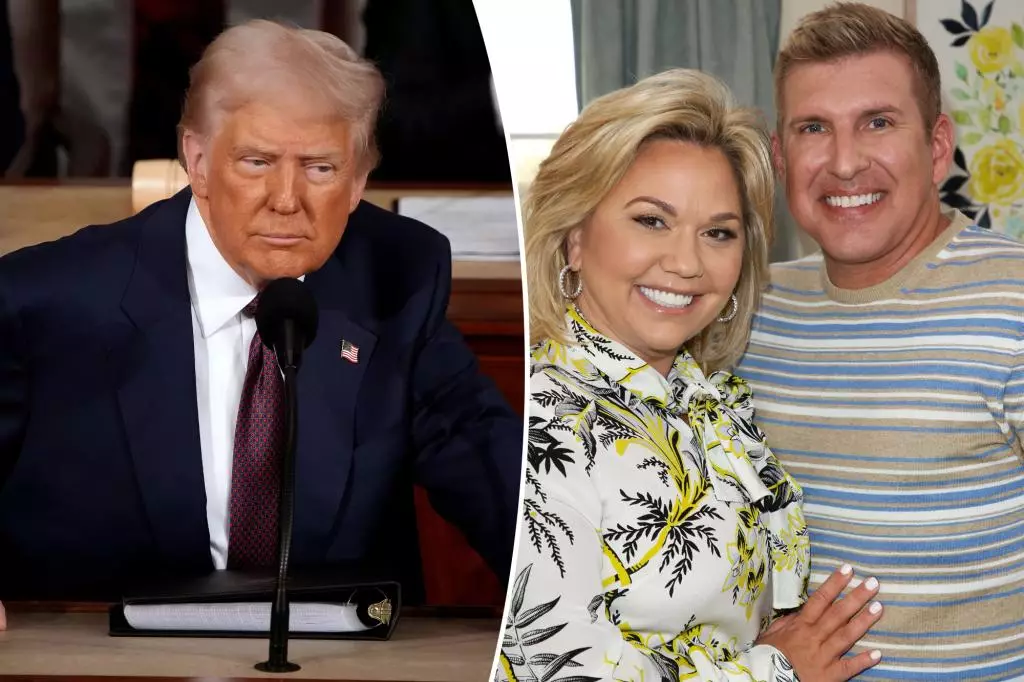The recent decision by President Trump to grant pardons to reality TV stars Todd and Julie Chrisley has sparked considerable controversy and debate. Their release from prison following convictions for serious financial crimes raises critical questions about the justice system, the role of celebrity, and political influence. This situation, emblematic of broader societal issues, transcends mere celebrity gossip—it’s a reflection of ongoing tensions in the American legal landscape, particularly concerning equity in treatment under the law.
At 56, Todd was serving a 12-year sentence for bank fraud and tax evasion, while 52-year-old Julie received a seven-year verdict for her own involvement in similar offenses. Their legal battles captivated reality TV audiences, but the scale of their alleged crimes cannot be understated; behavior described by prosecutors as a “career” of deceit where they misled banks and undermined tax obligations has raised alarm bells about accountability.
The Narrative of ‘Targeted Persecution’
The Chrisleys’ legal team has championed the narrative of the duo being unfairly targeted due to their conservative viewpoints and high-profile lives. Their attorney pointed to alleged constitutional violations throughout the prosecution process, labeling it as an “injustice.” This use of rhetoric reveals an interesting trend in modern America where the narrative of victimhood is increasingly wielded to deflect accountability. It raises an essential question: is this a legitimate defense rooted in truth, or merely a strategic move to recuperate public sympathy?
President Trump’s public endorsement—labeling the Chrisleys as “terrific people” while highlighting their supposed mistreatment—adds a layer of complexity. With his characteristic bravado, he promised swift action, stating on social media, “it’s a terrible thing. But it’s a great thing because your parents are gonna be free.” For many, this flies in the face of justice, suggesting that celebrity status and political connections provide a shiny escape route from the consequences of criminal actions.
Public Reaction and Implications
Reactions to the pardoning have been mixed, with fervent supporters declaring justice was served and critics deriding it as another thinly veiled instance of privilege. Many Americans see a stark injustice in the lack of fairness shown to less famous individuals who have faced similar charges without the luxury of legal reprieve through political favor. This incident raises uncomfortable questions about the inequalities that persist within the justice system.
Among the immediate implications, one must consider how this pardon might embolden other high-profile figures facing legal issues. Will they seek political connections, believing that skillful navigation through influence could alter their fates? Justice should ideally be blind, but the Chrisley case opens a window of opportunity for wealthy defendants to manipulate the system using political connections.
Reality Television and Its Aftermath
The Chrisleys first captured audiences with their hit show “Chrisley Knows Best,” moving seamlessly through scripted family dramas and lavish lifestyles. This unique blend of reality TV has popularized cultural narratives that romanticize wealth and grit, often overshadowing the darker facets of their real-life implications. Their return signals a potential resurgence in popularity, but it begs another crucial question: should reality TV be seen as a platform for individuals who may evade justice, or can it also serve as a medium for genuine storytelling and reflection on societal values?
Amidst cheers from followers, the Chrisleys’ release could delude younger audiences into thinking financial irresponsibility and deceit can be overcome through the right connections. Their story may inspire a disconcerting admiration for defiance against the law, suggesting to impressionable viewers that fame and charisma can serve as a shield against accountability.
The pardoning of Todd and Julie Chrisley lights a provocative fire in discussions surrounding law, celebrity culture, and the integrity of the American justice system. The complexities of their case ripple through societal norms, challenging our perspectives and prompting calls for introspection on the disparities in how justice is applied through the lens of fame.

